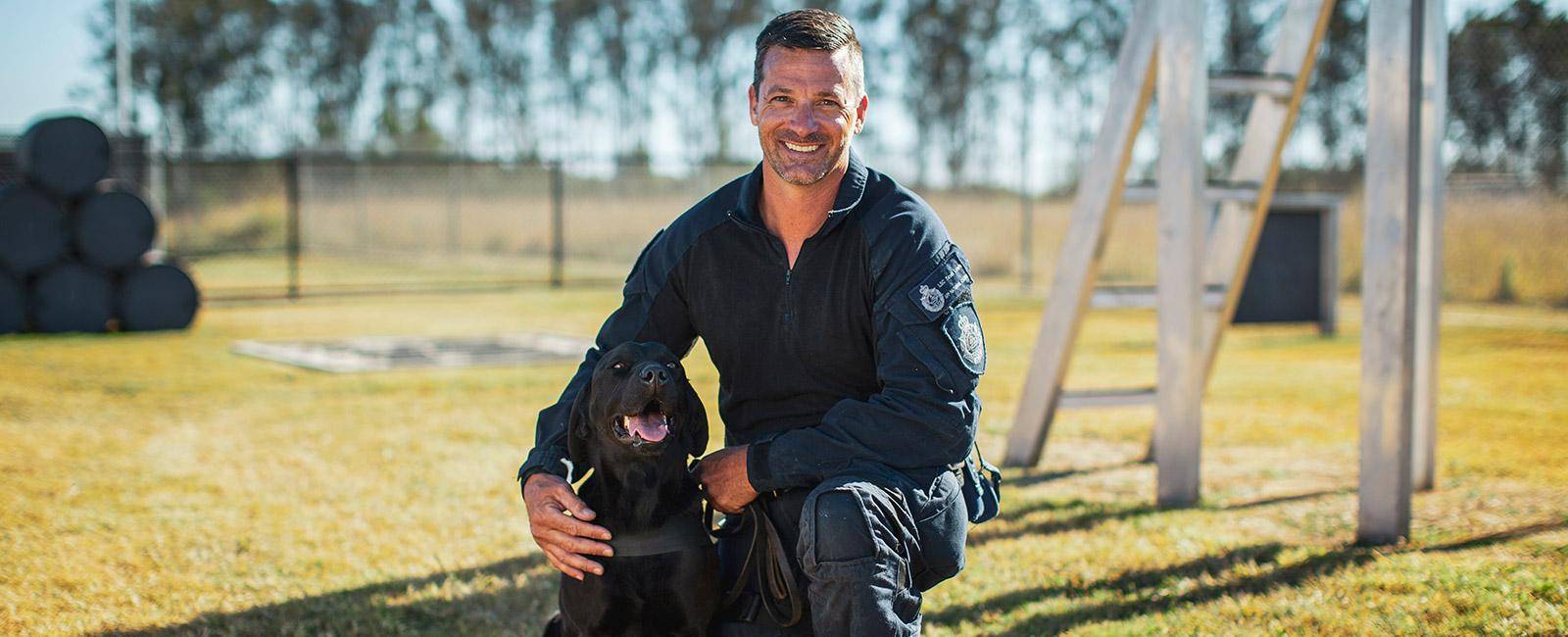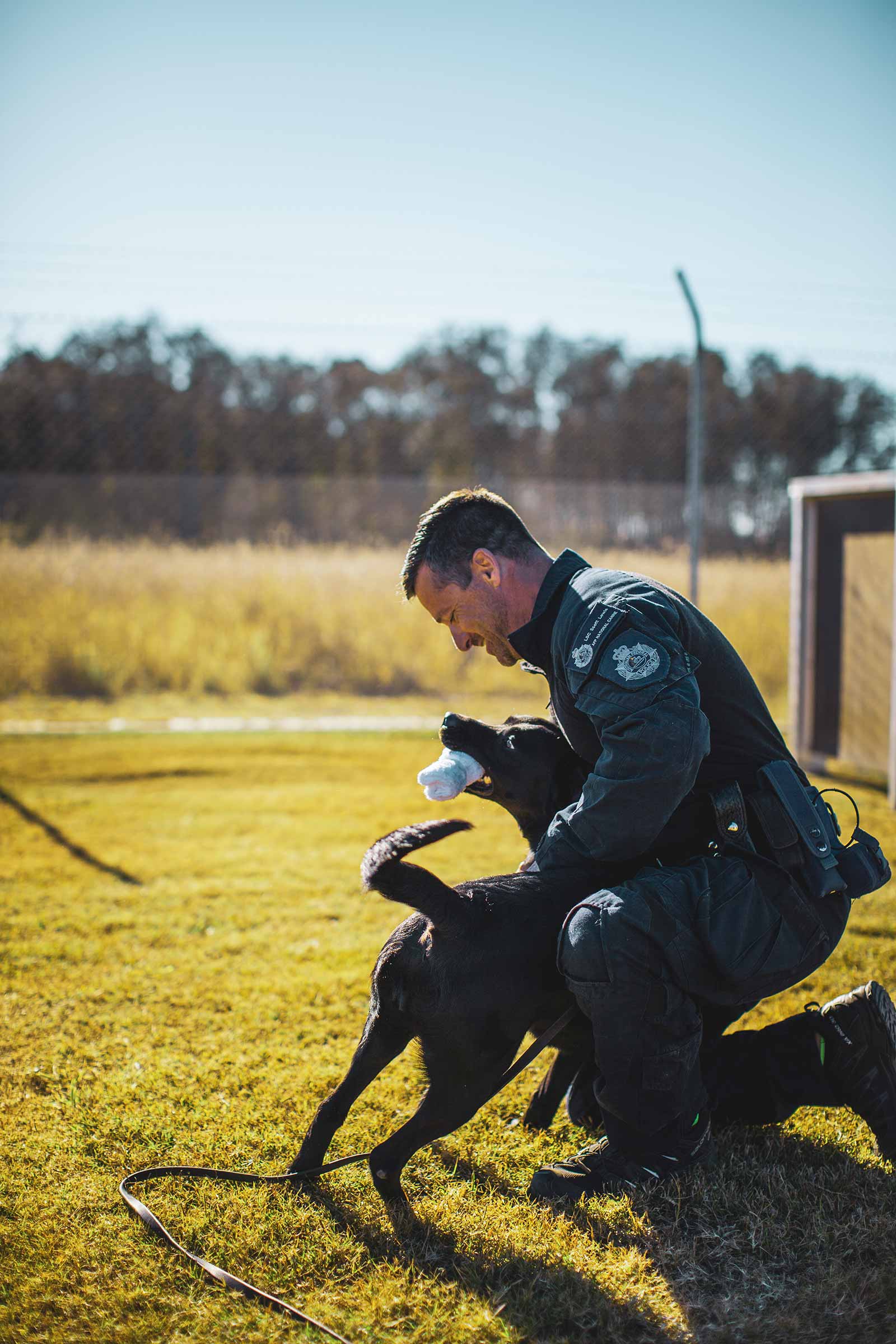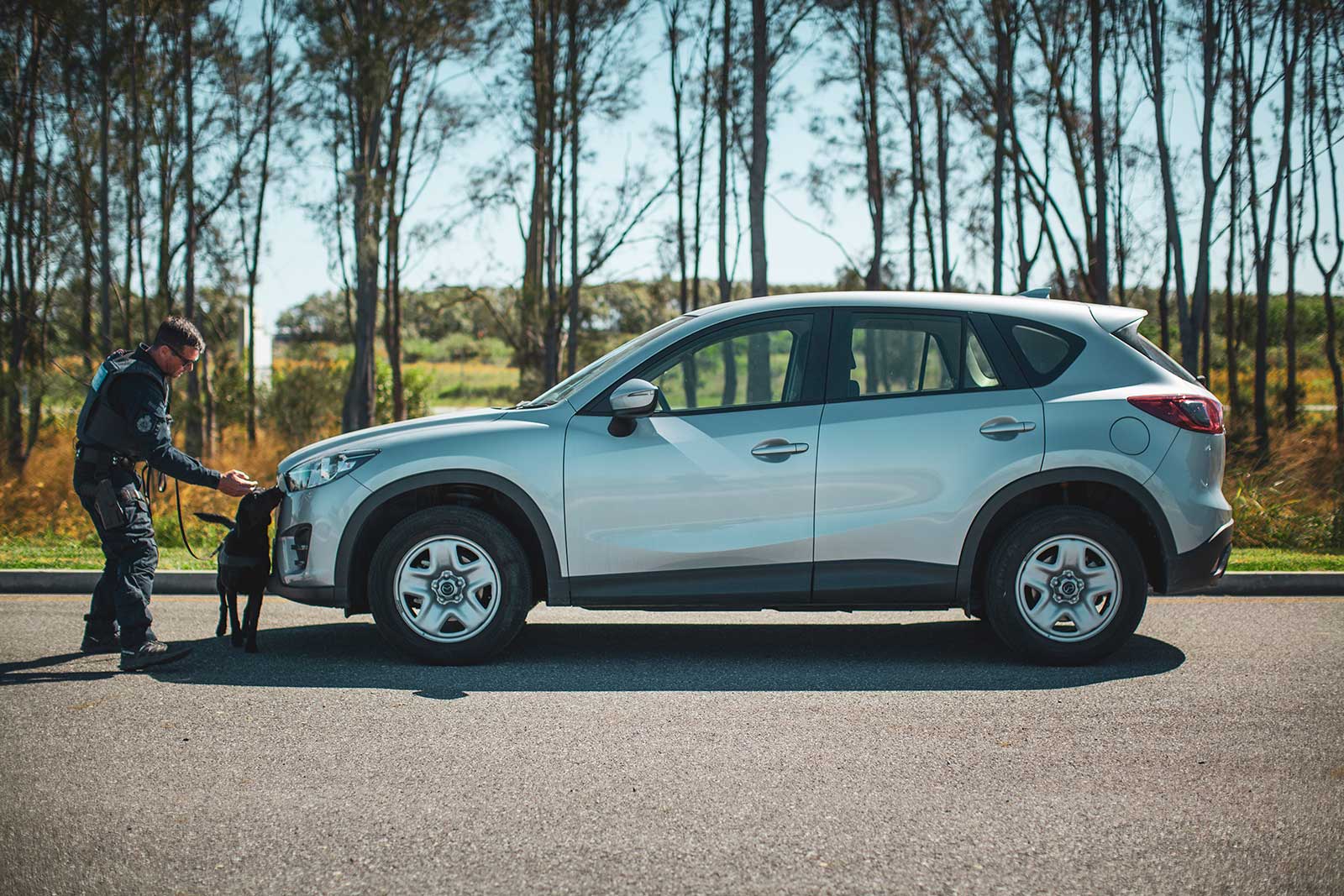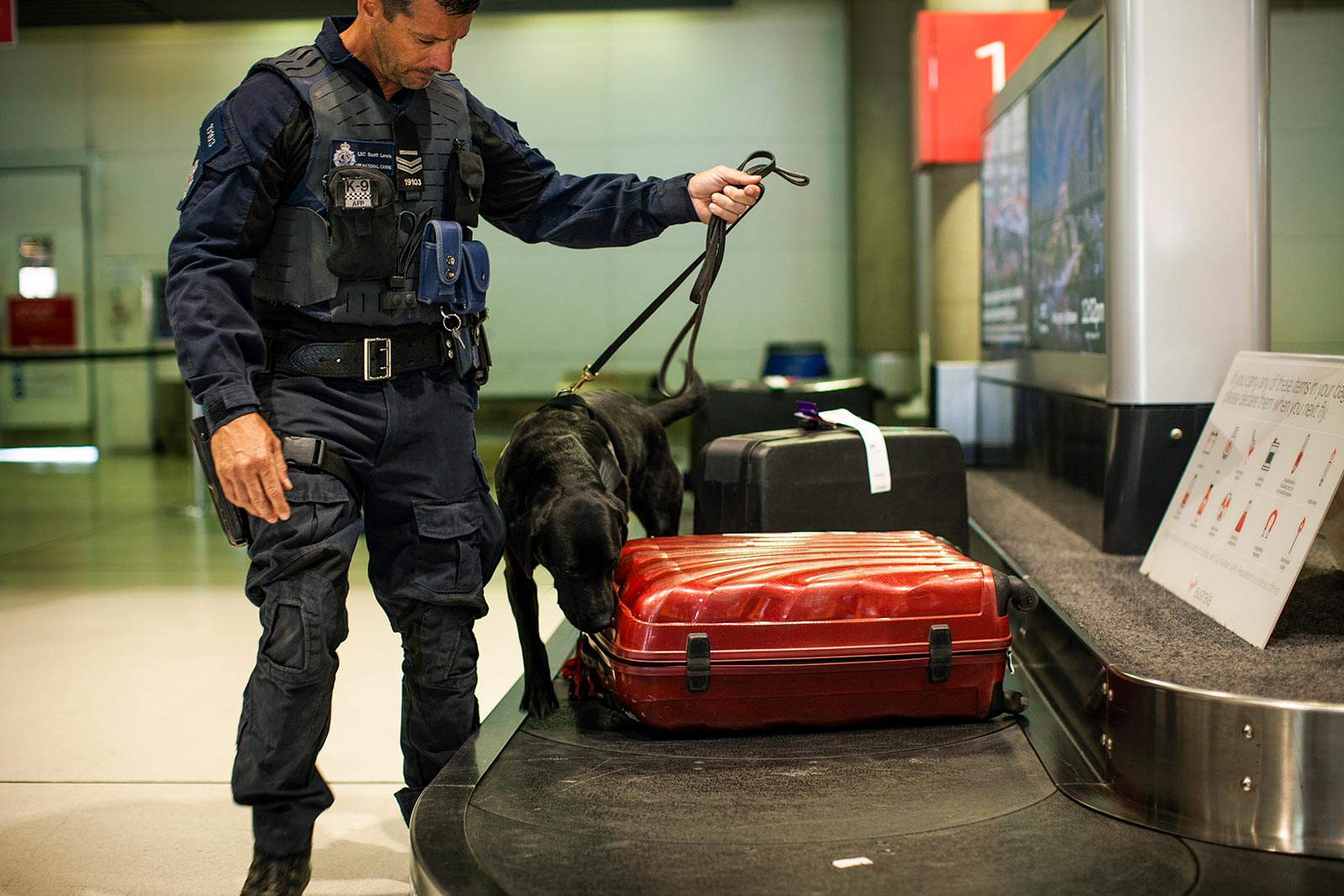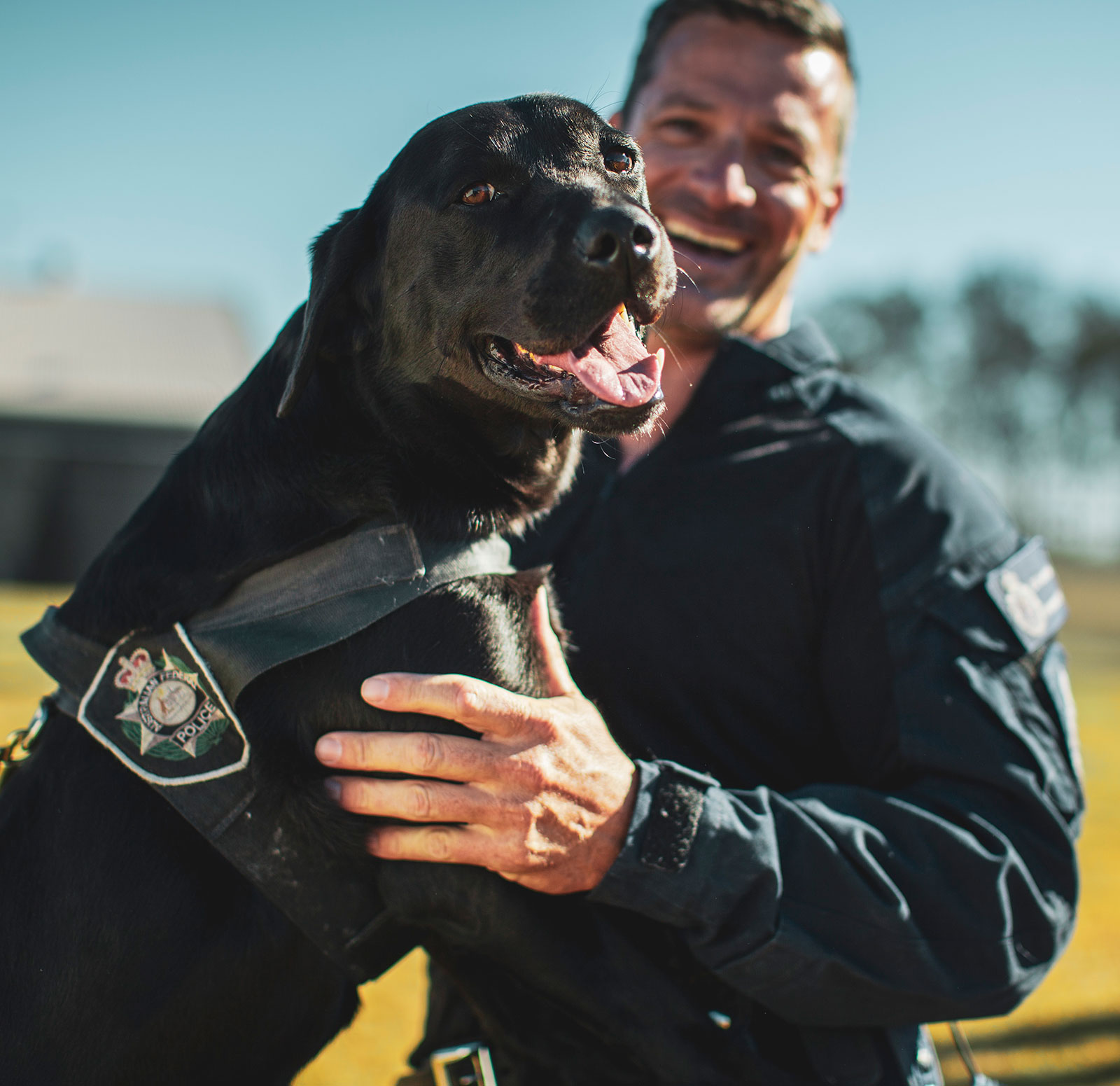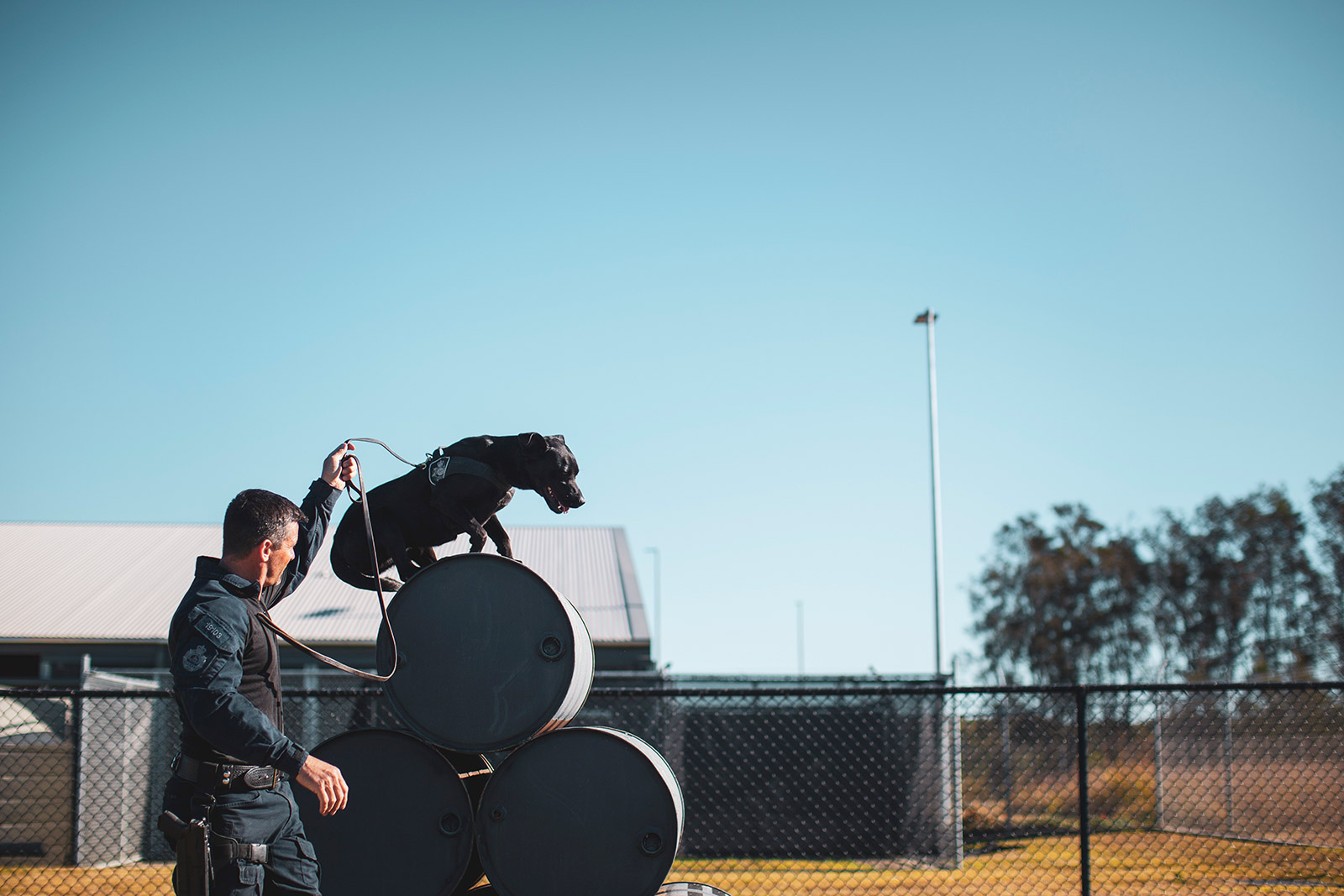
It’s 5am in the morning and the sun dances below the horizon, yet to rise. It’s a time of day where most people are still fast asleep in bed, but not Scott Lewis. His workday has just begun, and it starts out the same way it always does – with a brief moment of serenity that will invariably be broken by an over-zealous colleague the moment he walks through the door.
But it’s no ordinary office door. Scott is a Leading Senior Constable and Canine Handler with the Australian Federal Police (AFP), part of Protection Operations which is responsible for the safety and security at Brisbane Airport where he works alongside Firearms and Explosives Detector Dog (FEDD) Naya.
Naya is a two-and-a-half-year-old black Labrador affectionately known as ‘Hoover’ for her speedy eating abilities. She is the epitome of staunch and infectious joy. One look at her adorable pupper face and speedy tail-wag will tell you that in the last two years, Scott has never once dreaded going to work.
“The moment you step foot into the (kennel) runs, all hell breaks loose. The dogs go nuts! You can’t not want to go to work every day. It doesn’t matter how you’re feeling, they’re always happy and enthusiastic, nothing gets them down, and that instantly lifts your spirit.”
Scott joined the AFP in 2009 after nearly a decade with Victoria Police, going through a lateral entry program to join the Operational Response Group (ORG) Brisbane, where he spent a few years working as an Air Marshall.
“I’ve been here for about ten years. To see the way Brisbane Airport’s grown has been amazing and how fast and how big it’s grown – there’s so many different areas that we can work, and just the variety of the job each day is fantastic.”
The AFP is the primary law enforcement agency at the nine major airports across the country. The AFP’s presence at Brisbane Airport includes Airport Operation officers who provide a uniformed policing presence, and an Airport Police Commander who is responsible for the coordinated command and control of aviation policing and security activities in partnership with federal and state government agencies and private sector organisations.
Canine Operations work in conjunction with airport operations to deliver a coordinated, highly visible law enforcement capability to detect, deter and mitigate threats to our aviation environment. More simply, AFP detector dogs and their handlers are on the frontline of our national security efforts, protecting Australians from dangerous goods at the border and assisting in high-risk law enforcement operations.
“It’s a really important job that we do. We’re out there on the front line, protecting the Australian public when they’re travelling. The purpose of us being at the airport is part of a multi-layered security screening process. She’s a small part of it, but she’s basically there to detect firearms and explosives."
Scott first met Naya at the start of a 16-week course where they both went in ‘green’ (rookies). Scott had three other dogs while Naya was quarantined only to be run by one of the head trainers due to her erratic nature, but half-way through the course, they were teamed up and haven’t looked back since.
Their bond is undeniable. It’s one built on communication, trust, and a whole lot of pats. Naya’s day starts with Scott at 5am in the morning, and together they work a 10-hour shift four-times a week. Scott is responsible for all her cleaning, feeding, vet care and training, but he doesn’t see his responsibilities as a burden.
“These dogs are extremely important to us as handlers. I love this job, because where else can you come every single day and work with these guys?! I also love the problem-solving aspect of it. The dogs develop issues along the way, and you’ve got to try and fix those and get them into their best operational capacity.”
As Scott so aptly points out, having a dog as a work partner is great. After all, the conversation’s always good and they’re easy to get along with. But more importantly from a law enforcement point of view, dogs have a skill that far exceeds that of any human or piece of technology.
“Dogs have been used for a number of years in detection work and they’ve proven time and time again to be more efficient and probably more detailed than we can ever be.”
Where most humans are dependent on their sight to see the world, dogs interpret the world through their nose as they have an olfactory system (sense of smell) that is completely different to anything else on the planet. Dogs have two different air passages – one for breathing and one for smelling.
The passage through which dogs smell air contains highly specialized olfactory receptor cells, which are responsible for receiving smells. A dog’s nose contains about 225-300 million smell receptors compared to just 5 million in a human nose.
Additionally, dogs can remember all the different smells they have sensed throughout their life as their brains have a much larger olfactory cortex when compared to humans (40 times larger).
“They’ve also got the ability to distinguish between odours. So, if we were to walk into a room and smell a margarita pizza, the dog would walk into the same room and smell the pizza base, the tomato in the sauce, the basil, the oregano, the cheese – they can distinguish between all different odours.”
The AFP Canine Program trains, develops and maintains dogs in disciplines including firearms and explosive detection dogs, currency and drug detection dogs, general purpose dogs, and tactical dogs. To make the grade, they’ve got to be an exceptional dog, and training is based on repetition and reward.
“I put it down to 80 per cent of your time is spent training and caring for the dogs, and 20 per cent of the time is worked operationally, so it never stops. The dogs need to be assessed every 12 months from Canberra. They send instructors out to test their capability on all the odours that they’re qualified in, and it’s up to us to continue the training throughout the year to get them to that standard and keep them at that standard.
“We separate the different capabilities because the responses and the actions that we (do) for explosives as opposed to drugs is totally different, and it would also be impossible to keep the skill set up if they had the dual capabilities.”
Naya is primarily involved in screening incoming and outgoing passengers, searching incoming baggage and cargo, and is even called upon for operational activity in the community.
The on-going success of the AFP Canine Operations is undoubtably down to the handlers, who ensure the dogs are well looked-after and are not bored with performing the same duties day after day.
Scott allows Naya to search for around 15 minutes before giving her a few minutes break to ensure she is performing optimally, but he always accounts for specific conditions and weather when working with her. The same rule applies on training runs. He is also sure to reward her after every successful find, with the reward being a game such as tug-o-war accompanied by many pats.
“These dogs are amongst the best cared for dogs in Australia. They’ve got the best vet care, the best nutrition and the best exercise regime a dog could ask for.
“Naya is a pretty resilient dog. She’ll bust through anything to get a result for me. I’m pretty proud of us as a team for what we’re doing. She’s pretty amazing in what she does, and it’s obviously an important role.”

